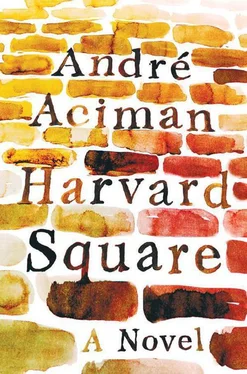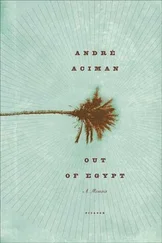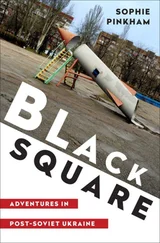It was Zeinab who spoke about it as soon as Kalaj said he needed to go to the bathroom.
He was going to be deported, she said. Even the Freemasons, to say nothing of the Legal Aid Society, were unable to stop it. His impending divorce hurt his chances a lot. Actually, it wasn’t a divorce. The marriage had been annulled.
“We’re still going to have to find a way,” I said, feeling that simply resolving to do something was already a way of doing something.
“I don’t think there’s anything he can do at this point.”
“What if he decides to stay as an illegal and disappears, say, in Oregon or Wyoming?”
“I don’t think it will work. He doesn’t want to be illegal.”
“What will he do then?”
“Probably go back. He can’t go back to France. So, you see, for him it’s back to Tunisia.”
But that’s like saying that the past seventeen years of his life — half his life — never happened, I thought. To go back to his parents’ home, to go back to the old bedroom where he’d slept and might still have to sleep with his brothers as he’d done as a child, to go back to a place where he dreamed of a France he had not yet seen only to realize that he’d not only already seen France, but that he’d lived and gotten married there and might never be allowed to set foot again there—“It would drive him crazy,” I said, suddenly thinking of myself hurled back to Alexandria after forswearing it forever. “It would be like being born again into a life one couldn’t wait to escape.”
“Not a second birth,” said the Moroccan. “More like a second death.”
Kalaj had lived with “second deaths” all his life both before and after France. He was not the type to say that experience is all to the good, that nothing is wasted in life, that everyone we meet and everywhere we go, down to the most squalid, insignificant job we hold, plays a tiny role in making us who we become. This was ersatz palaver, and Kalaj was too brutal with himself to think this way. There were no second chances in his book of life; you simply dipped into yourself and pawned the little that was left from earlier deaths. For him there were bad turns, and there were cruel tricks, and terrible mistakes, and from these there was no coming back, no expiation, no recovery, no turning over a new leaf. To live with yourself you had to cut off the hand that offended, cut, slice, peel, scrape, and tear away at yourself till all you were left with were your stripped-down bones. Your bones gave you away; you could not hide your bones, nor could you avoid staring at them. All you wanted was for others to be stripped down like you — lean, intemperate, and skeletal — you didn’t need to confide, and they wouldn’t need to confide, because both of you would know, just know, as a parent knows, as a sibling knows, as a lover, a real lover, knows that you were down to your last straw. Meanwhile, his unforgiving private God no longer manned a tablet or a staff. His weapon of choice was rage and a Kalashnikov.
He thought I was a fellow legionnaire of the bone who’d dropped by at the same watering hole with the same empty gourd and the same thirst for more than just plain water. I had disappointed him. He thought that, like him, I might be all human, raw passion. It took someone like him to remind me that, for all my impatience with life in New England and all my yearning for the Mediterranean, I had already moved to the other side.
I thought of him wearing a suit on the evening when his student had invited him to dinner. He’d been tempted by the Satan of ersatz that night, and Kalaj would have yielded. As I had yielded. As everyone does.
When Kalaj returned, he said he would join us in the car. It would give us a few extra minutes together.
It was the first time I’d been in his car with him when he wasn’t driving. Without knowing it, I was making mental notes: the cigarette-rolling trick while driving, the yelling at old Boston as he cut his way through its narrow alleys with bristling rage and scorn in his voice because the streets here were simply stupid and ersatz, the occasional whistle when someone deserved a compliment and he didn’t know enough English other than to just whistle. In the car he reminded me of my father after everything he owned including his car was nationalized by the Egyptian government and he was forced to ride in other people’s cars, looking awkward and uneasy when he didn’t have a steering wheel before him. Kalaj sprawled himself in the back of his own cab, giving directions and shortcuts on our way to Concord Avenue.
When we reached my building, the Moroccan double-parked the old car while Kalaj sprang to help me out of the car. Did I need help going up the stairs?
No. I could manage. But in typical Arab fashion, he did not step back into the car until I disappeared up the stairs to the landing on the first floor. Then I heard the car leave.
TWO DAYS AFTER I’d nearly fainted at Café Algiers, I met the woman from Apartment 43 on the stairwell. She was carrying groceries, I was carrying a light plastic bag from the Coop, so I offered to carry one of her packages upstairs. “Not throwing any more dinner parties?” she asked, that glint of irony always in her eyes.
“No, not recently.” Then I realized I’d never invited her and her boyfriend to our dinner parties when Kalaj used to cook. But I didn’t want to pretend I was planning a dinner party anytime soon. I was moving to Lowell House, I said. She looked crushed.
“Why?”
“Free lodging, closer to the Square and the libraries, better deal all around.”
“But no privacy,” she said.
“No, no privacy, that is true.”
Were we speaking in double entendres? When she opened her door, she let me in, and I walked into her apartment, and then into her kitchen, where I deposited one of her bags on the counter. Like Linda’s, her apartment also was mine in reverse. The idea intrigued me, everything about her intrigued me. We talked about apartments; she’d always wondered about my place. Did she want to take a look? I had just bought a recording of Brahms’ Clarinet Quintet. A gift from me to me, I explained. Birthday? No, just came home from an operation two days ago. Gallbladder, I said.
“Ouch!” She had completely forgotten about the night when her boyfriend had driven me to the infirmary. “Are you going to be OK?”
“I think so,” I said. She needed to put some of her food away first, then said she’d drop by.
“Would you care for a latte? I was going to make one for myself on a Neapolitan coffeemaker.”
She had never heard of Neapolitan coffeemakers.
“You’ll see,” I said.
“But are you allowed to drink coffee?” she asked.
“I can have booze, ergo coffee is good.”
“OK,” she said.
I did not leave through the front door but found something thrilling in using the service entrance and then opening my door and walking right into my kitchen, as though we had discovered an undisclosed conduit between us that had always been in place though we’d both chosen to overlook it. I liked the idea of a back door to a back door, of secret passages and hidden trapdoors for quick exits and easy access while her boyfriend was, say, in the shower or about to come in through the front door. I liked coming home to myself through someone else’s home.
“I always leave my door unlocked,” I said.
She walked in when the coffee was already brewing, loved the scent, she said, as she closed first her door, then mine. “I always like it when you make coffee.”
“I always like it when you cook bacon in the morning.”
Perhaps it was our way of saying we had been keeping secret tabs on each other and that we hoped neither suspected we did until that time when we’d both feel a special thrill in finally admitting it to each other. “We never invited you,” she finally said, something like apology and regret underscoring her words.
Читать дальше












